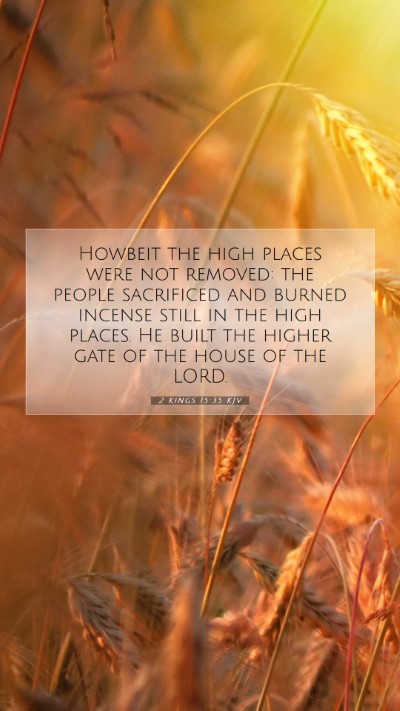Understanding 2 Kings 15:35: A Comprehensive Bible Verse Commentary
2 Kings 15:35 states: “Howbeit the high places were not taken away: the people sacrificed and burnt incense still in the high places.” This verse provides a significant insight into the religious practices during the reign of Jotham, king of Judah, and illustrates the theological and historical context of Israel at that time.
Context and Historical Background
This passage occurs during a tumultuous period in the history of Israel and Judah, marked by political intrigue, societal upheaval, and the worship of Yahweh alongside various pagan practices. Jotham ascended to the throne after his father, Uzziah, who had been struck with leprosy. Despite his father's shortcomings, Jotham followed the ways of the Lord, yet the high places remained—a symbol of syncretism and a failure to fully reform the nation’s worship (Matthew Henry).
Key Themes in 2 Kings 15:35
- Religious Compromise: The persistence of high places signifies a compromise in true worship, where the people mixed Yahweh's worship with pagan rituals.
- Lack of Reform: Although Jotham did right in the eyes of the Lord, his inability to remove these high places indicates a broader issue of accountability and spiritual reform within the kingdom (Albert Barnes).
- Divine Judgment: The proliferation of these practices contributed to the eventual judgment upon the nation, highlighting the dangers of half-hearted worship and moral decay.
Commentary Insights
According to Albert Barnes, this verse emphasizes the both the positive aspects of Jotham's reign—doing what was right in God’s eyes—and the negative realities that undermined it, namely, the unchecked high places where sacrifices were offered. This duality speaks to how external adherence to God’s laws must align with internal faithfulness and purity of worship.
Adam Clarke notes that the continued existence of high places suggests that the people favored convenience in worship over the commandments outlined in the Torah. These high places became synonymous with idolatry and misdirected worship, leading to a dilution of the covenant relationship between God and His people.
Application of 2 Kings 15:35 Today
In modern interpretations, this verse prompts readers to examine personal and communal worship practices. Are there 'high places' in our lives—idols or practices—that distract or detract from a pure allegiance to God? Believers are encouraged to pursue not only a correct understanding of worship but also to engage in meaningful reflection over areas of compromise in their faith.
Cross References
- 2 Chronicles 27:2: Presents a parallel account of Jotham's reign and additional insights into his faithfulness and shortcomings.
- 1 Kings 15:14: Discusses similar themes regarding religious practices and the high places during previous reigns.
- Deuteronomy 12:2-3: God’s command to destroy the high places serves as the foundation for understanding the significance of Jotham’s failure to act.
Conclusion
2 Kings 15:35 serves as a critical reflection on the nature of worship and the importance of holistic faithfulness to God. The insights gleaned from this verse can enhance our Bible study insights and enrich our understanding of Scripture. It challenges believers to confront their personal worship practices while being reminded of the continual need for spiritual renewal and dedication to God.
For those engaging in Bible study groups or seeking Bible study resources, this analysis is essential for deepening your understanding of how historical contexts reveal profound lessons in commitment to true worship.


